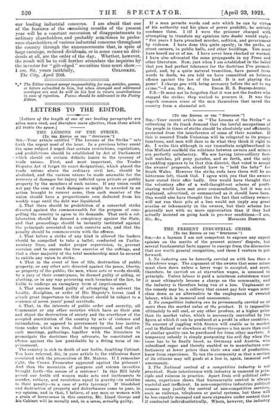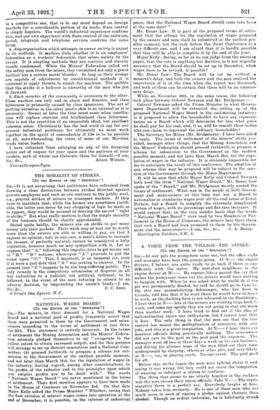THE PRESENT INDUSTRIAL CRISIS.
[To THE EDITOR OF TEE " SPECTATOR."] SIR,—AS a layman I am not competent to express any expert opinion on the merits of the present ,miners' dispute, but several fundamental facts appear to emerge from the discussion that are worth general recognition, and these I venture to put forward.
1. No industry can be honestly carried on with less than a subsistence wage. The argument of the owners that some mines must close down unless a lower wage is accepted, and must, therefore, be carried on at starvation wages, is unsound in principle. Unless labour is paid a minimum subsistence wage it must ultimately become a charge on the community, and the industry is therefore being run at a loss. Unpleasant as the remedy may be, a colliery that cannot pay fair wages must close down as an alternative to the employment of sweated labour, which is immoral and uneconomic.
2. No competitive industry can be permanently carried on at more than the market value of the product. It is impossible ultimately to sell coal, or any other produce, at a higher price than its market value, which is necessarily controlled by the figure at which it can be produced at a profit in other countries. No amount of juggling with finance will enable us to market coal in Holland or elsewhere at threepence a ton more than coal of similar quality can be purchased for from other markets. A temporary subsidy is simply postponing the evil day when the issue has to be finally faced, as Germany and Austria, who subsidized sugar and thereby enabled us to manufacture con- fectionery at lower prices than their own cost of production, know from experience. To tax the community so that a section of its citizens may sell goods at a loss is, again, immoral and uneconomic.
3. The National control of a competitive industry is not practical. State interference with industry is unsound in prin- ciple and ruinous in practice. Apart from evil political influ- ences, experience shows that bureaucratic control is always wasteful and inefficient. In non-competitive industries political reasons may justify the control of non-competitive services, such as railways, telephones or postal systems, but 'these will be less capably managed and more expensive under central than if conducted individualistically, Where, however, the industry is a competitive one, that is to say must depend on foreign markets for a considerable portion of its trade, State control is simply hopeless. The world's industrial experience confirms this, and our own experience with State control of the railways, postal, telegraph and telephone services confirms the same thing. .
4. Any organization which attempts to coerce society is unjust in its methods. It matters little whether it is an employers' federation or a workers' federation that seizes society by the throat. It is adopting methods that are coercive and thereby stands condemned. When the Miners' Federation called out the safety men from the mines, they committed not only a grave tactical but a serious moral blunder. So long as their wrongs are capable of adjustment by constitutional methods it is criminal to apply threats to smash the machine. The quibble that the strike is a lock-out is unworthy of the men who put it forward.
5. Each member of the community is necessary to the other. Class warfare can only end in chaos and disaster, and class bitterness is primarily caused by class ignorance. The art of putting ourselves in the other man's skin is as unusual as it is necessary. Sooner or later the time must come when concilia- tion will replace coercion and brotherhood class bitterness. This is not the repetition of an impossible ideal, but excellent common sense. Christianity' has the last word to say for our present industrial problems, for ultimately we must work together in the spirit of comradeship if life is to be possible at all, notwithstanding the views of some of our Marxian trade union leaders.
I have refrained from enlarging on any of the foregoing points out of respect for your space and the patience of your readers, each of whom can elaborate them for himself.—I am,



































 Previous page
Previous page